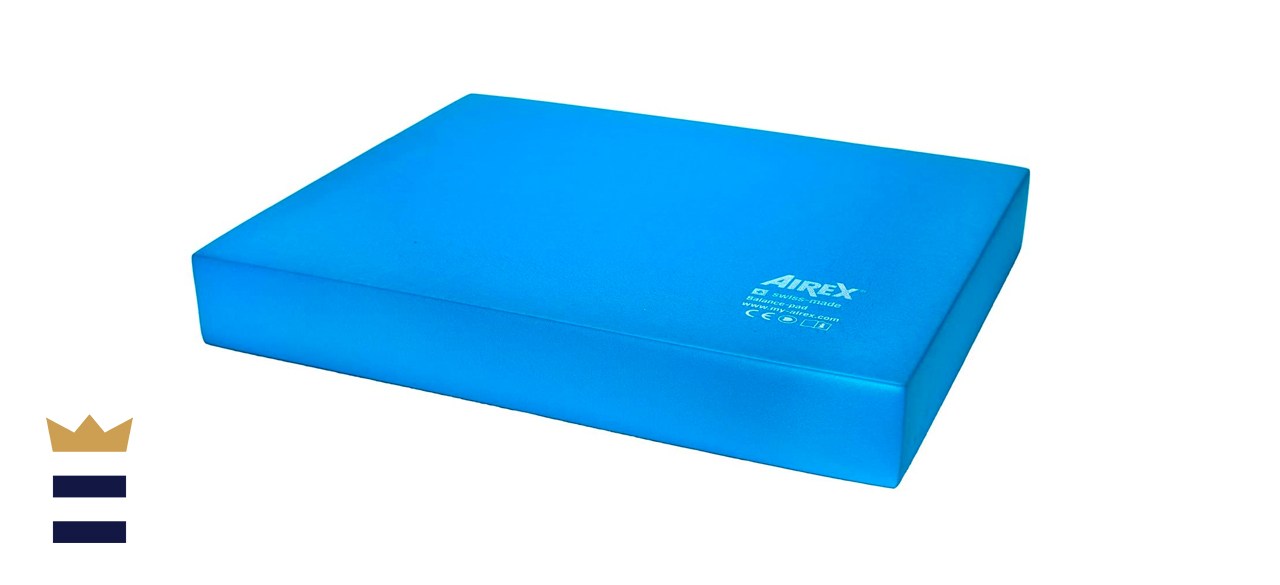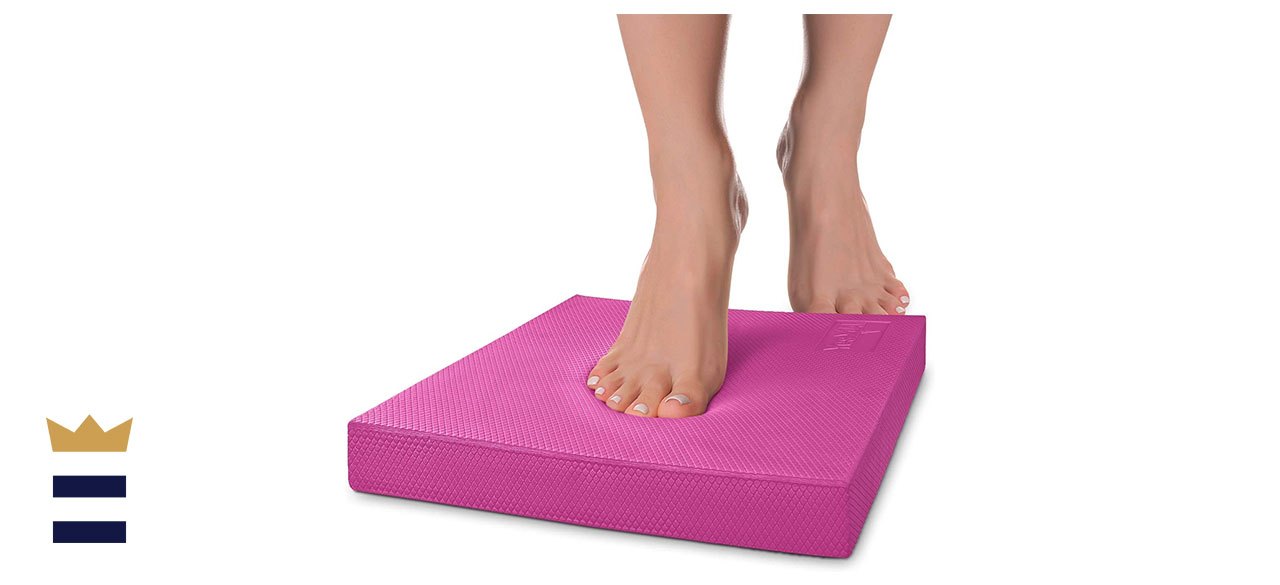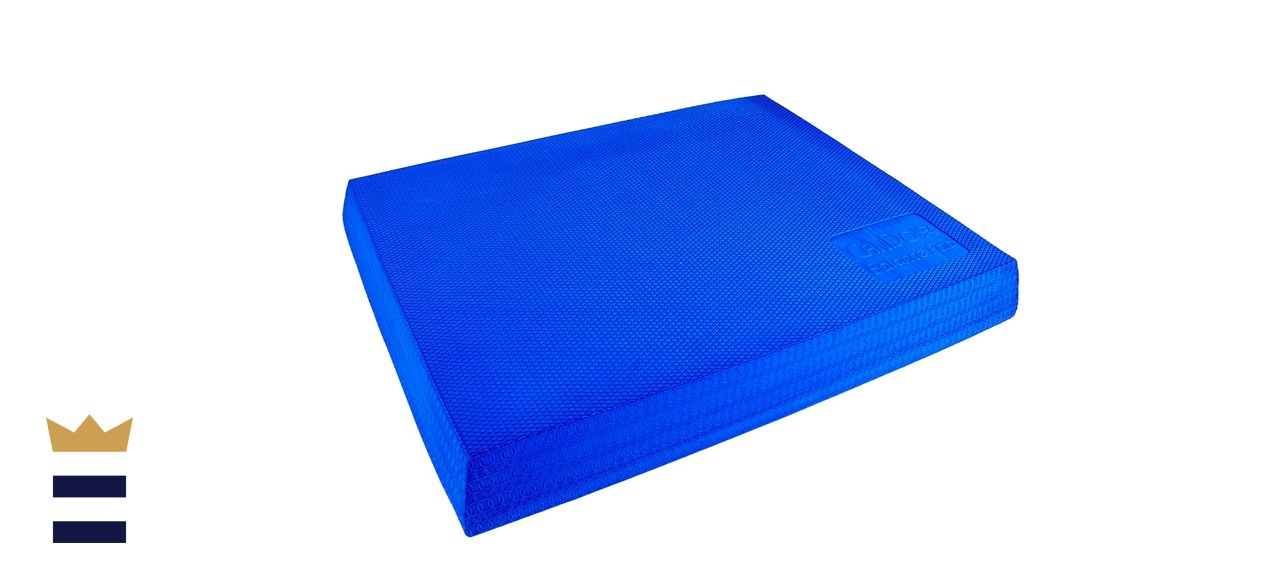Which balance pads are best?
If you want to bring your workout to the next level, you don’t necessarily have to try an entirely new routine. Introducing a balance pad to your usual strength training workout can help take it up a notch by requiring all of your muscles to spring into action to support and stabilize your body.
A balance pad has a spongy texture, so your body sinks into the material when you step on it. That means all your muscles must engage to keep you balanced on the pad, which makes your regular workout that much harder. If you’re looking for an excellent balance pad for everyday use, the Airex Balance Pad is the top choice.
What to know before you buy a balance pad
Size
Balance pads are typically available in three size options: small, regular and large.
- Small balance pads are generally only large enough to place one foot on at a time. They usually have an oval shape and measure 16 by 9 inches or smaller. You can find some rectangular models if that’s more comfortable.
- Regular balance pads are considered the standard size and measure 20 by 16 inches. You can step onto them with both feet at the same time, making them excellent for squats and other similar exercises.
- Large balance pads are approximately 38 by 16 inches and are sometimes classified as “extra-large.” Like regular balance pads, you can stand on them with both feet, but they provide even more space to maneuver.
You can also find balance beam-style pads, which are a safer alternative to a balance beam, since there’s not as much distance from the pad to the floor. They measure approximately 63 by 10 by 2 inches and have a wider base. You use these pads by walking along them with one foot in front of the other to help you work on your balance.
Quantity
The number of balance pads you need largely depends on whether you’ll be working out alone or with a partner.
Most workouts only require one balance pad. Exercises such as lunges and squats typically call for you to place one foot on the pad at a time, though some may require stepping with both feet. If you tend to work out by yourself, one balance pad is probably all you need.
If you work out with one or more partners, though, you’ll need one pad for each person exercising.
Dry vs. wet
Because of their lightweight construction, balance pads can float in water. As a result, some people actually purchase them to use as a flotation device. A regular-size balance pad can work well as a kickboard, while large models can work as full-size boards for kids. You can also use a balance beam pad as a neck rest when floating in the water.
If you want to use your balance pad for both workouts and swimming, it’s a good idea to purchase two: one for dry use during exercise and one for wet use in the pool.
Safety concerns
A balance pad requires you to strain your muscles to remain balanced, so it’s not uncommon to fall when using one. As a result, you must use a balance pad in a wide-open area to prevent injuries. Make sure there is no furniture or other item with sharp edges in the vicinity to pose a risk.
If you don’t have an open place to use the pad, it’s a good idea to ask a friend to spot you while working out.
What to look for in a quality balance pad
Material
Most balance pads are made of closed-cell foam. Some models feature ethylene-vinyl acetate foam, while others offer latex-free foam. You can even find some manufacturers that advertise nontoxic, eco-friendly foam options.
Because all balance pads are made of similar soft foam, you can choose whatever type you like. If you have a latex allergy, you definitely want a latex-free one.
Color
Some balance pads are available in a wider range of color options than others. Many brands only offer a single shade. Common balance pad color options include blue, black, green, red and purple.
Textured surface
Higher-end balance pads often have a textured, non-slip surface. You’re generally supposed to use a balance pad barefoot, so some traction on the surface can help you stay balanced. These textured pads tend to cost more, though.
How much you can expect to spend on a balance pad
Most cost $19-$75. The majority of small and regular-size pads range from $19-$40, while regular-size, textured pads can cost between $50-$75. For large and balance beam pads, though, you’ll likely pay more than $75.
Balance pad FAQ
Are balance pads the same thing as balance boards?
A. They’re a bit different, though they’re both designed to boost your strength and balance during low-impact workouts. Pads are made of soft foam, while balance boards feature harder materials. A balance pad is typically more effective at engaging multiple sets of muscles because of its softer material.
Can I use a balance pad if I’m a beginner?
A. A balance pad can be challenging to use if you’re just starting an exercise routine, because the foam can throw off your balance. If you’re not used to doing a particular workout, you may fall and get injured. It’s best to introduce a balance pad to your workout routine once you can complete all of the exercises confidently on solid ground.
What’s the best balance pad to buy?
Top balance pad
What you need to know: This durable, well-designed balance pad holds up to daily use with ease.
What you’ll love: The pad is effective for improving strength and balance. It can also help boost flexibility. It works well for physical therapy and can help improve confidence for everyday activities while you’re recovering. It’s excellent for improving balance for those who work at a standing desk, too.
What you should consider: While effective for balance exercises, it’s not ideal for high-impact workouts.
Where to buy: Sold by Amazon
Top balance pad for the money
What you need to know: Recommended by physical therapists, this versatile balance pad is effective for both rehabilitation and everyday use.
What you’ll love: Its even padding throughout is ideal for people recovering from knee issues. It also comes in handy for regular workouts and can be used during everyday activities like watching TV. It not only improves balance but flexibility, too.
What you should consider: It can feel somewhat stiff compared to other foam pads.
Where to buy: Sold by Amazon
Worth checking out
What you need to know: This affordably priced balance pad is effective for improving balance even for beginners.
What you’ll love: The pad features an anti-skid surface to make it easier to maintain your balance. The price is an excellent value, considering how effective it is for building balance and strength.
What you should consider: The simple design isn’t suited for more complicated rehabilitation exercises.
Where to buy: Sold by Amazon
Want to shop the best products at the best prices? Check out Daily Deals from BestReviews.
Sign up here to receive the BestReviews weekly newsletter for useful advice on new products and noteworthy deals.
Jennifer Blair writes for BestReviews. BestReviews has helped millions of consumers simplify their purchasing decisions, saving them time and money.
Copyright 2023 BestReviews, a Nexstar company. All rights reserved.




















